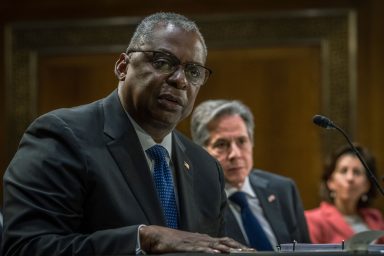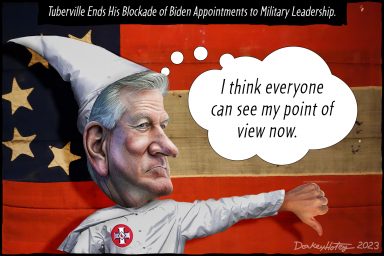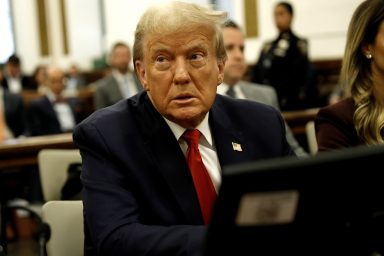Does it seem a little bit odd that John Edwards is facing a potential thirty year jail term? There’s been plenty of focus on the charges against him and on the trial—but precious little on why Edwards was even investigated and prosecuted in the first place. It’s worth pondering which politicians have been made to take a fall and which have not—and why. There may be more here than meets the eye.
 Does no one else find the very fact of John Edwards being on trial curious? Does no one else wonder about the criminal basis for the prosecution? About who in politics does and does not end up being destroyed by matters related to sexual behavior?
Does no one else find the very fact of John Edwards being on trial curious? Does no one else wonder about the criminal basis for the prosecution? About who in politics does and does not end up being destroyed by matters related to sexual behavior?
Let me preface my take on the Edwards trial with one general observation: Not all politicians are created equal. And not all are treated equally. Therein lies an issue deserving a much, much closer look: whether vulnerable Democrats, chiefly of the liberal persuasion, are targeted for destruction. Or at least helped along to their doom by a double standard.
***
But first, the specifics of the Edwards case. He faces a potential $1.5 million fine, but, far more seriously, up to thirty years imprisonment. Thirty years. His crime? Not murder, not torture, not armed robbery, not stealing money from clients. No, his crime was his failure to report campaign contributions. While preparing for his second presidential bid, in 2006, he got caught up in an extramarital affair that produced a child. And, not exactly able to announce that fact or ask his sick wife to sign off, the wealthy Edwards turned to some wealthy backers to take care of the woman and the baby and hide the whole thing from Elizabeth Edwards and presumably everyone else. Two people gave him a total of $900,000.
When someone running for office receives money, or the benefit of money or services, that’s a contribution, and it must both be reported and be subject to restrictions on amount. Unless of course it has nothing to do with the campaign itself. Certainly, candidates receive ordinary income (such as fees for lawyering) that is not subject to those limits. And if someone gives a candidate a gift that is not used for the campaign, it is similarly not subject to campaign finance laws.
So, what’s the ill intent here—and the consequence for the public interest? If this were a bribe by someone seeking to influence Edwards as an office-holder, that would be one thing. If the money were intended to help sway voters to support Edwards, that might be valid cause for pursuing the case aggressively. But nothing about the two donors, both elderly (one has since died), suggests an attempt to gain illegal influence. In reality, both donors –the billionaires Rachel “Bunny” Mellon and Fred Baron—apparently liked and believed in Edwards and, when asked, were quick to aid him in a tough spot.
If it sounds like Edwards still needed to apply FEC rules and limits, consider this: Scott Thomas, a former commissioner of the Federal Election Commission testified that he did not consider that the payments would have come under his agency’s auspices—in part because they were not used directly for the campaign and did not free up any of Edwards’ own money to be spent on the campaign. And Thomas noted that the gifts from one of the donors continued after Edwards dropped out of the race, indicating they were not for campaign purposes. Unfortunately for Edwards, the ex-commissioner, a 37-year FEC veteran with great credibility on these matters, was only permitted to testify without the jury present—and the jury may never get to hear from him.
In any case, one doesn’t need to in any way defend Edwards’ conduct to see that the matter is a bit complex, and the prosecution for a federal crime, and the prospective punishment, extraordinarily harsh.
The “Liberal” Media Loves to Sink Liberals
What’s this really about? The equal application of election law? Equal pursuit of actual corruption? An equal standard of sexual misbehavior and how it should be handled? It’s hard to see any of these legitimate concerns front and center here.
What did strike me about this matter is that it seems to confirm a feeling that I have long had: Progressive Democrats who get caught with their pants down appear to pay a steeper price in terms of impact on their career prospects—if not criminal prosecution— when compared to similarly compromised corporate-friendly Republicans.
Let’s consider the long list of Democrats before John Edwards who were wounded by accusations of sexual misbehavior: Gary Hart. Gary Condit (who was tied to the disappearance and murder of a young woman; although in the end it turned out he had nothing to do with it, he was ruined anyway because of an alleged dalliance with the young woman). Bill Clinton. Eliot Spitzer. Anthony Weiner. (I’m sure I am forgetting some.)
Republican politicians seem no less prone than Democrats to adultery and other common if frowned-upon behavior. But compared to the infamy visited upon those named above, how many of us recall all the GOP/Conservative Scandals? How often were these the topic of constant chatter on the major talk radio programs? Try David Vitter, Newt Gingrich, Jon Ensign, Dan Burton, Helen Chenoweth, Henry Hyde, Robert Livingston, Mark Foley, to name but a few. Several quickly resigned but the only one who, pardon the expression, went down after extensive coverage (and his own resistance) that I can recall was Larry Craig—whose public washroom behavior (and tone-deaf defense thereof) was pretty hard to ignore.
In fact, given the standard GOP claim to represent “family values” and morality in general, it would seem that shenanigans from that side of the aisle would warrant more attention—and graver consequences — if for nothing more than the inherent hypocrisy and cynicism.
We cannot ignore the decision-makers who decide whom to prosecute, partially in response to unstated political and other pressures. Nor should we ignore the role of the media (and supposed friends of the Democrats) in sealing their doom.
The New York Times, purported linchpin of the liberal media, hammered Bill Clinton and broke the Eliot Spitzer call-girl story. Gary Hart was investigated by the purportedly moderate-liberal Miami Herald and Washington Post. Clinton was taken to the woodshed by Joe Lieberman and some feminists. Spitzer was quietly mugged, off-record, by his Attorney General Andrew Cuomo, who was only too glad to capture the governorship himself two years later. In the case of Rep. Weiner, the saturation coverage made it difficult to recall that he had not actually had sexual contact with the women he was sending messages to. Nevertheless, he was assailed by prominent liberal blogs and cut off by Nancy Pelosi; his seat, a sure Democratic bet, went GOP in a special election.
The same cannot be said, in general, of conservative politicians or conservative media. Their tendency has been to largely ignore, or to understate, or to deflect attention from the Republican shenanigans and abuses.
So much for the notion of a “liberal” media showing favoritism to its own. My experience is that the “liberal” label when applied to journalists is a red herring which distracts us from the fundamentally accomodationist nature of the corporate-owned media. But the liberal label is effective in pressuring journalists to prove they do not coddle liberals—by doing the exact opposite.
The media is, by nature, cowardly. It too seldom goes after powerful people over the actual business of governing because it is too hard to make the audience care. And it only goes after people for misusing their peckers when it senses that a mob is forming, that there’s blood in the water. Then it is all about going to the head of the pack.
If we examine the case of Republican Sen. David Vitter of Louisiana, the contrast to Edwards’s treatment is startling. Sen. Vitter, a slavish advocate of oil industry and other corporate interests, broke the law prior to 2004 by patronizing prostitutes while a member of the House. The scandal broke after he had been elected to the Senate; he is still in the Senate. When it became public that his name was in the records of a Capitol Hill escort agency, Vitter put out a written statement of contrition, went into a week of seclusion, emerged and, with his wife (who happens to be a prosecutor), made a brief public apology, then refused to answer questions. He was never prosecuted due to the statute of limitations. The woman who ran the call girl ring he frequented, Deborah Jeane Palfrey, aka the “DC Madam,” was found hanged in what was labeled a suicide, after publicly saying that if anything happened to her, she most certainly did not intend to do harm to herself.
Had Vitter stepped down, the Democratic governor of Louisiana at the time would presumably have appointed a Democrat to temporarily fill his seat—an important factor in a closely divided Senate.
The hypocrisy of a “family values” politician like Vitter knows no bounds. When Vitter was in the House of Representatives he actually took calls from the DC Madam during roll call votes; later, Sen. Vitter expressed outrage over purported actions of the poverty group ACORN, where several staffers showed tolerance toward conservative operatives with a hidden camera who were pretending to be involved in prostitution.
So Vitter is still in the Senate, defending the sanctity of marriage between one man and one woman, while Anthony Weiner, who was never accused of any crime, was forced to resign by howls of protests from all quarters, including the Democratic leadership who abandoned him in the face of the “inevitable.”
Ye Olde Honey Pot
The media—and hence the public—tend to focus more attention on failings in politicians’ private lives than in their public ones. We already know that politicians are all too human in their private tastes, which appear to have little cause-and-effect relationship to their conduct in office. But we continue to make personal rectitude the standard of fitness for politicians, rather than the actual policies they advocate—and the interests that shape their priorities.
Yet, paradoxically, it is exactly in their public actions and the policies they espouse that we may look for the roots of these selective scandals. Could politicians with the “wrong public values” be targeted for a fall?
I find it instructive to look at the specifics of Edwards’ predicament, and the curious decision to prosecute in a federal court what was, while morally inexcusable, private behavior involving chiefly the wronging of a spouse.
-Edwards became enamored of a woman who approached him—and who was well aware that he was married, and how exposure of the affair could impact his future if it became public.
-The story came to the public in part with the help of the National Enquirer, the same paper that played a prominent role in Hart’s downfall in the run-up to the 1988 Presidential election..
-Edwards was, like Hart, a handsome, charismatic—and populist—candidate, a rare liberal hope in a party traditionally prone to nominating “system” moderates. His issues were poverty and income inequality, climate change, universal health care, and withdrawing troops from Iraq. When Rielle Hunter approached him in 2006 he was on a cross-country tour to help labor unions.
-Hunter in some ways is reminiscent of other women who came forward to ruin or nearly ruin Democratic politicians with accusations of sexual improprieties—while personally profiting from their actions–including Donna Rice (Hart), Gennifer Flowers (Clinton) and Ashley Dupre (Spitzer). Meanwhile, some of those who turned on Edwards, notably his former aide Andrew Young and his wife, have by their own admission done well financially for doing Edwards in.
-Though Hunter was their entire case, prosecutors were sufficiently wary of her (or perhaps of drawing additional attention to her precise role in the matter) that they did not call her to the witness stand.
This investigative reporter smells a rat in Edwards’s downfall. Maybe I’m wrong. I’m not sure exactly who decided what, when, but consider that Hunter was down on her luck when she happened to bump into Edwards while he was in a hotel bar. The following excerpt is instructive. It comes from a book by Edwards’ former aide Andrew Young, now a prosecution witness against Edwards (The Politician):
The senator first met Rielle in early 2006 when he was in New York during a cross-country speaking tour with actor Danny Glover on behalf of hotel workers who wanted his help at union rallies. As she eventually told me herself, she saw Edwards in the lounge of the Regency, a five-star hotel on Park Avenue…..
By the time she saw John Edwards, she had lived much of her life on the edge of glamour, wealth, and enlightenment but was, at forty-one, divorced, unemployed, and living rent- free with a friend in New Jersey named Margaret “Mimi” Hockman.
When she made eye contact with the senator…she asked him if he was the candidate she had seen on television. After he identified himself, she said, “You’re so hot, but on television that doesn’t come through. You seem distant. I can help you with that.”…
Rielle …decided immediately that she would devote herself to helping him reach this potential. This assistance would begin later, after she arranged to bump into him on the sidewalk, where she would flirt some more.
What’s even more interesting is that Hunter wasn’t really in a position to do what she promised. Partnering with her roommate, the two had to recruit still others to execute rudimentary video and editing work. Soon she and her crew were traveling with the politician, filming him in cinema verite style for online “webisodes.”
Now, how about Hart? The Hart scandal had the flavor of an operation designed to remove an enormously popular, populist candidate from the race. (Hart was at the time the leading Democratic candidate, and well ahead of his likely Republican opponent, vice president George H.W. Bush, in match-ups.)
Hart was invited onto a boat with a ridiculously newsworthy name (“Monkey Business”), an attractive blond plopped in his lap, and a waiting photographer got the money shot. A private investigator provided journalists with a report saying that Hart and the blond, Donna Rice, appeared to have spent the night together. Other reporters were given an anonymous inside tip. The story reads right like a thriller—or an intelligence op. A bit like how Watergate became a sensation. (See our series on the downing of Nixon here.)
It is now common knowledge that Clinton was targeted by a well-oiled Right-Wing operation (not too far off from Hillary Clinton’s statement, seemingly wild at the time, that her husband was the victim of a “vast, right-wing conspiracy”). We never did learn quite enough about how someone with Monica Lewinsky’s modest credentials and unique charms (just the sort Bill Clinton was known to appreciate) ended up interning for him. On the surface, it all looks innocent enough, but I’ve seen enough hints, and, over the years, enough comparable scenarios, to wonder.
Message: If You Mess With the Establishment, Don’t Mess With the Ladies
The Spitzer story featured a cast of corporate kingpins angry at his actions as attorney general, and the GOP “dirty tricks” specialist Roger Stone. Exactly how Spitzer’s financial transactions drew federal attention has been inadequately explored, as has why so big a deal was made of his extracurricular activities (the central federal legal “issue” was that he arranged for a prostitute to cross state lines). As for Anthony Weiner, he was targeted by the late provocateur Andrew Breitbart and fellow Right-wing activists who used fake email addresses and pretended to be underage girls.
Probably the most interesting thing is how many of these guys who went down—or in Clinton’s case nearly did—were messing with powerful interests. Excepting perhaps Clinton, they all had a streak of populism—going after bankers, and the one percent, and, in at least one case, the CIA. Hart and Edwards both had stirred class-conscious politics prominently into their broader messaging. Hart was on the investigative Senate committee that looked into CIA abuses in the 1970s, and became an outspoken critic of the excesses of the spy establishment—just as Richard Nixon was secretly battling the CIA, the Pentagon, and corporate interests at the time that the Watergate scandal began to undo his presidency. Weiner was a liberal and a close ally of the Clintons with an eye on the New York mayor’s office. Spitzer was a leading figure in targeting Wall Street, insurance industry and other corporate abuses. He was one big problem for some tough customers, and had his eye on the White House next.
Is all this worth another look? This reporter thinks so.
# #
GRAPHIC: http://images.politico.com/global/enquirer.edwards.jpg


